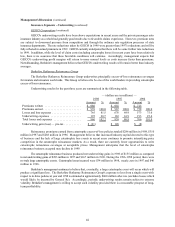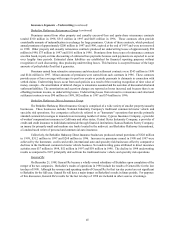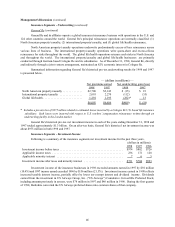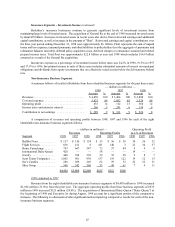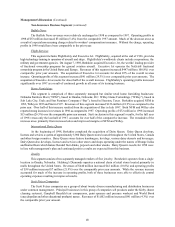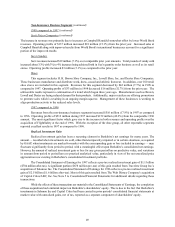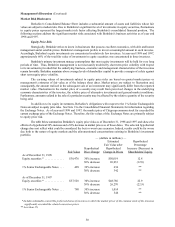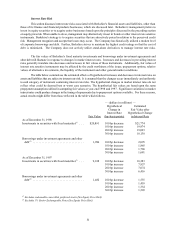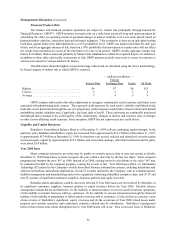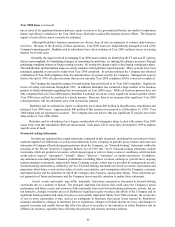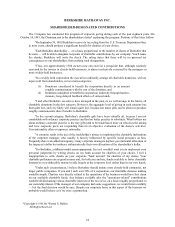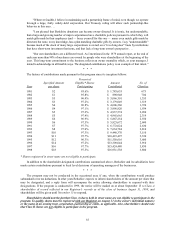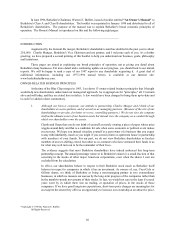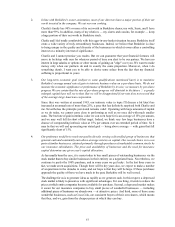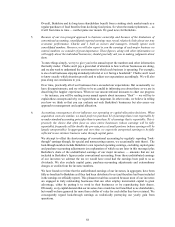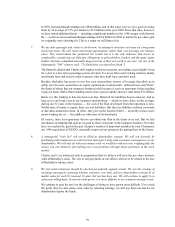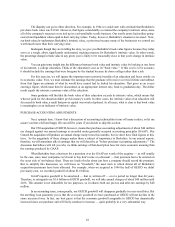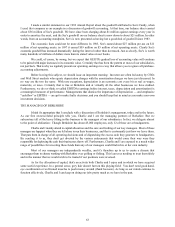Berkshire Hathaway 1998 Annual Report Download - page 55
Download and view the complete annual report
Please find page 55 of the 1998 Berkshire Hathaway annual report below. You can navigate through the pages in the report by either clicking on the pages listed below, or by using the keyword search tool below to find specific information within the annual report.54
BERKSHIRE HATHAWAY INC.
SHAREHOLDER-DESIGNATED CONTRIBUTIONS
The Company has conducted this program of corporate giving during each of the past eighteen years. On
October 14, 1981, the Chairman sent to the shareholders a letter* explaining the program. Portions of that letter follow:
"On September 30, 1981 Berkshire received a tax ruling from the U.S. Treasury Department that,
in most years, should produce a significant benefit for charities of your choice.
"Each Berkshire shareholder — on a basis proportional to the number of shares of Berkshire that
he owns — will be able to designate recipients of charitable contributions by our company. You'll name
the charity; Berkshire will write the check. The ruling states that there will be no personal tax
consequences to our shareholders from making such designations.
"Thus, our approximately 1500 owners now can exercise a perquisite that, although routinely
exercised by the owners in closely-held businesses, is almost exclusively exercised by the managers in
more widely-held businesses.
"In a widely-held corporation the executives ordinarily arrange all charitable donations, with no
input at all from shareholders, in two main categories:
(1) Donations considered to benefit the corporation directly in an amount
roughly commensurate with the cost of the donation; and
(2) Donations considered to benefit the corporation indirectly through hard-to-
measure, long-delayed feedback effects of various kinds.
"I and other Berkshire executives have arranged in the past, as we will arrange in the future, all
charitable donations in the first category. However, the aggregate level of giving in such category has
been quite low, and very likely will remain quite low, because not many gifts can be shown to produce
roughly commensurate direct benefits to Berkshire.
"In the second category, Berkshire's charitable gifts have been virtually nil, because I am not
comfortable with ordinary corporate practice and had no better practice to substitute. What bothers me
about ordinary corporate practice is the way gifts tend to be made based more on who does the asking
and how corporate peers are responding than on an objective evaluation of the donee's activities.
Conventionality often overpowers rationality.
"A common result is the use of the stockholder's money to implement the charitable inclinations
of the corporate manager, who usually is heavily influenced by specific social pressures on him.
Frequently there is an added incongruity; many corporate managers deplore governmental allocation of
the taxpayer's dollar but embrace enthusiastically their own allocation of the shareholder's dollar.
"For Berkshire, a different model seems appropriate. Just as I wouldn't want you to implement your
personal judgments by writing checks on my bank account for charities of your choice, I feel it
inappropriate to write checks on your corporate "bank account" for charities of my choice. Your
charitable preferences are as good as mine and, for both you and me, funds available to foster charitable
interests in a tax-deductible manner reside largely at the corporate level rather than in our own hands.
"Under such circumstances, I believe Berkshire should imitate more closely-held companies, not
larger public companies. If you and I each own 50% of a corporation, our charitable decision making
would be simple. Charities very directly related to the operations of the business would have first claim
on our available charitable funds. Any balance available after the "operations-related" contributions
would be divided among various charitable interests of the two of us, on a basis roughly proportional to
our ownership interest. If the manager of our company had some suggestions, we would listen carefully
— but the final decision would be ours. Despite our corporate form, in this aspect of the business we
probably would behave as if we were a partnership.
*Copyright © 1981 By Warren E. Buffett
All Rights Reserved


